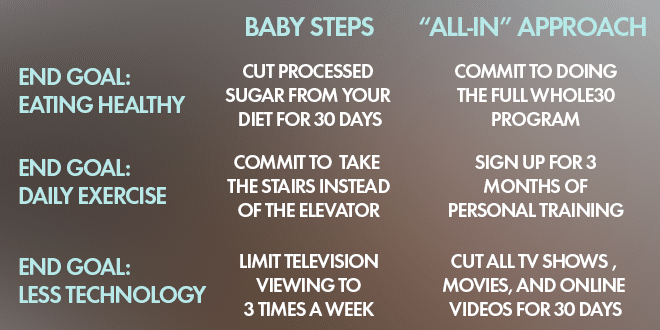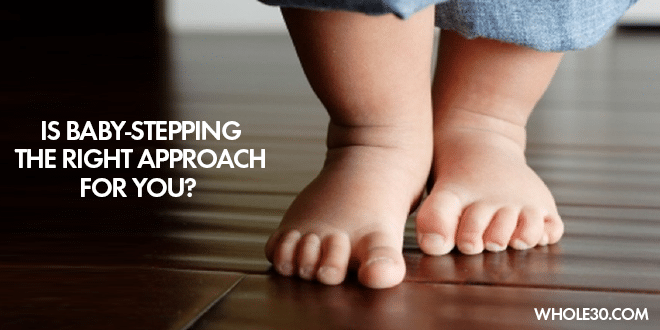By Whole30® co-creator Melissa Urban, with help from The Paleo Mom and author of The Paleo Approach, Sarah Ballantyne, PhD When you’re trying to make a change, be it eating healthier, exercising, or not being so connected to technology, it’s hard to know exactly how to start. Do you jump in with both feet, or do you take small steps one at a time? Habit research shows that both approaches can lead to long-term success, but only if you choose the right approach for you.  Today, we’ll list the pros and cons of baby-stepping (making small changes one at a time), and pose some questions to help you determine the strategy that’s right for you.
Today, we’ll list the pros and cons of baby-stepping (making small changes one at a time), and pose some questions to help you determine the strategy that’s right for you.
The Pros of Baby-Stepping
Smaller changes seem more manageable. The idea of getting rid of all sugar, alcohol, grains, and dairy might seem inconceivable from where you are right now, but you could probably handle eliminating processed sugars from your diet for the next four weeks—and reading your labels may help you to be more health-conscious with your other food choices too. Taking small steps makes getting started down the long path easier, because you only have to look a short distance down the road to reach your first goal. Smaller changes can make the process less painful. If you’re coming from a horrible diet, a sedentary lifestyle, or an addiction to your iPhone, making a huge, sweeping change will probably make your life really unpleasant for the first week or two as your body and brain adjusts to your new diet, exercise regimen, or technology hiatus. Making smaller changes may help you ease the transition, both mentally and physically, and dilute the painful side effects of “detoxing” from your old, unhealthy habits. Smaller changes can build a sense of self-confidence. Setting small, easily attainable goals may give you a feeling of accomplishment, which creates a greater sense of self-efficacy. This makes it that much easier for you to tackle the next goal, creating a positive feedback loop where you feel capable, so you want to do more, which makes you feel even more capable.
The Cons of Baby-Stepping
You’ll see progress a lot slower. Smaller changes may be easier to make, but they also have a much smaller pay-off, and stretches out the entire change process start to finish. If you’re in the middle of a health crisis, on final warning from your boss, or have decided you need to see benefits now, taking small steps isn’t going to get you where you need to be anywhere near fast enough. You may not see any progress at all. Sometimes baby-stepping moves so slowly, you appear to go nowhere. Giving up processed sugar may not improve your weight or health condition at all if there are other things on your plate still causing problems. This means you’re a month into your “new diet” and still not seeing the benefit—which makes you far more likely to abandon your efforts and go right back to your old habits. Your willpower wears out faster, because you’re making more decisions. Baby-stepping keeps every decision in the front of your brain, in “effort” territory. Simply limiting some of your technology use (“I’m only watching TV three nights a week”) leads to ongoing battles of willpower, keeping your brain focused on the struggle. Tonight is a one-time event, surely that doesn’t count? What if you watch the last few minutes of the game on your computer between emails? Is tonight your night, or should you save it for tomorrow? Each of those decisions costs you—and may lead to a willpower wipe-out in other areas of your life.
Which Approach is Right For You?
Think about a new habit you’re working on right now, and your current context. You’ll probably instinctively know which approach—baby-stepping vs. making big, bold change—you should take to achieve long-lasting, honest change. But what if you still aren’t sure, or see benefits to both approaches? We asked Sarah Ballantyne, blogger at The Paleo Mom and author of The Paleo Approach, how she counsels her readers to go about taking on change. Sarah says, “Which approach a person chooses will depend on their personality, historical behaviors, motivation, and challenges. Ask yourself the following questions to help you determine whether a baby-step or ‘all-in’ plan is right for you.” Are you a rule-breaker or a rule follower? Rule followers tend to do better with all-or-nothing approaches like the Whole30, while rule-breakers might be tempted to rebel, even if they chose the rules themselves. How far do you have to go? If you’re already exercising a few days a week and just want to step up your game, you could probably go all-in, as you’ve already established the basic habit of regularly moving your body. If you’ve been sedentary, however, you might find it easier to start with something small. How motivated are you? If your boss says you’re fired if he catches you on social media again, you’re pretty darn motivated to go all-in and cut non-work internet use out completely. If, on the other hand, this is just a personal development goal, you may be happier to baby-step your connection down. What are your challenges? If your family will eat whatever you make them, why not jump straight to a Whole30, where you can all reap the huge payoff? If there will be mutiny at every dinner, however, you may want to just cut back on processed foods and take-out until they get adjusted to the idea. How stressed are you, and would your chosen approach make it better or worse? This is the question that blankets all of the others, and may make or break your decision. If you’re stressed to the gills due to a major health crisis, you have little choice but to go all-in… and the dramatic benefits will far outweigh the stress of making the change. If you’re stressed to the gills because of financial constraints, purchasing an expensive personal training package is probably just going to make your stress worse, even if it does motivate you to exercise. Evaluate where you are and the potential benefits of each approach for you, in this moment—in conjunction with all of your other answers.
Choose Your Own Adventure
One more thing—your approach can (and maybe should) be different for each and every change you are trying to make. For example, you may commit to jumping straight into a Whole30 to clean up your diet, but when it comes to technology, you decide taking it bit by bit is the best way to get you to the end goal. There’s nothing wrong with changing things up based on the circumstances—in fact, it’s likely that making deliberate, carefully evaluated decisions on a case-by-case basis will bring you a better return on investment than following a blanket strategy for all your change efforts. One study looking at habit change and weight loss concluded, “The challenge (to habit change success) lies in figuring out which changes work for each individual and how to stick with them long enough to make them second nature.” By evaluating each individual habit change against our list of pros and cons, asking yourself relevant questions, and choosing the right strategy for your individual context, you’ll be setting yourself up for new habit success—and real change that lasts.
















